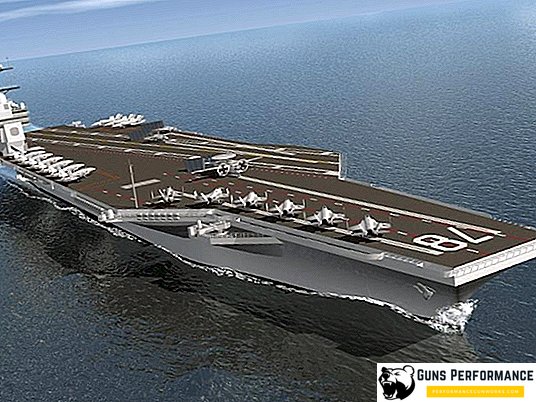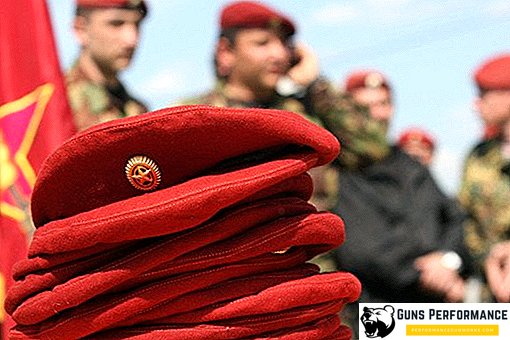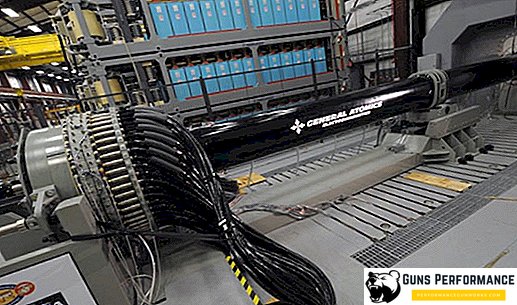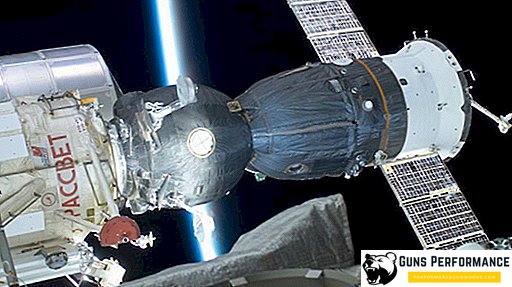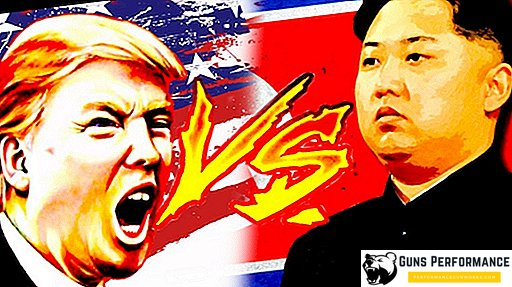
In recent months, the attention of the world community has again been turned to the Far East. Syria and Ukraine are forgotten, protests in Venezuela and even the ominous ISIL are relegated to the background - on the Korean Peninsula it once again smelled of great war.
US President Donald Trump and the US military every now and then send the world hard messages about the Korean problem, Pyongyang, in turn, also does not remain in debt. A few days ago, the Russian Foreign Ministry announced that the risk of a conflict beginning is very high. In just a few years, the DPRK has made significant progress in the implementation of its missile program, and now, most likely, it is armed with missiles capable of hitting the territory of the United States and delivering nuclear warheads to it.
Moreover, a few days ago, Koreans threatened to strike the Pacific island of Guam, which is the territory of the United States.
In response to this threat, Trump promised to unleash "anger and rage that the world has not seen" on the DPRK, and the Pentagon spoke of a possible preventive strike. China and Russia, as usual, urge everyone to show restraint. At the same time, the Russian and Chinese divisions are pulling up to the Korean borders, the South Korean army and Japan’s self-defense forces are on high alert, and the Americans are dragging aircraft carriers and strategic aviation to the region. Does it come to war, or will the conflict remain at the level of verbal skirmish? And what should the world do with the North Korean regime, this enfant terrible of the Far East?
Current state of affairs
Relations between the United States and North Korea have always been bad or very bad. After the end of the bloody Korean war between these countries, a peace treaty was not signed, until now there is only a cease-fire protocol. However, the situation began to deteriorate rapidly after North Korea became a member of an elite nuclear club - in October 2006, the North Koreans conducted the first successful test of a nuclear charge. Further more.

In recent decades, Pyongyang has not only actively engaged in the improvement of its nuclear arsenal, but does not forget about the means of its delivery - ballistic missiles. And in this area the North Koreans were able to achieve just amazing results. They were even able to send their own military satellite into orbit.
Currently, Kim Jong-un’s missiles can not only reach the territory of Japan or South Korea, but also strike at their main enemy, American imperialism.
In addition to nuclear and missile weapons, the North Korean regime has more than a nightmare of its closest neighbors. North Korea has one of the largest armies in the world - almost 1.2 million (in 2012) and a huge amount of conventional weapons, albeit not the newest and most modern. Moreover, a significant part of it is located on the border with South Korea, the North Koreans have the opportunity to cover Seoul even from conventional artillery and the MLRS. According to some military experts, up to 40,000 different artillery guns were sent to the Seoul-Incheon conglomeration.

Throughout its history, North Korea has been constantly preparing for war: it built military factories and fortified areas, produced weapons, and in the most stringent manner “washed” its heads to its people. Today, the DPRK is a unique state, the second is not to be found on the planet, it is the real personification of Orwell’s darkest dystopias.
The United States has a fairly serious military representation in the Pacific, bases in Japan, South Korea and the Philippine Islands. The US Pacific Fleet is numerous and powerful; it includes aircraft carriers, submarines and ships with cruise missiles on board. In addition, elements of the American missile defense system (THAAD, Patriot PAC-2 and Aegis) are located in Japan and South Korea. Naturally, in the event of a military conflict, the armed forces of North Korea will be defeated, and the long-term Kim regime will be overthrown. However, at what cost will this be achieved? This question is the main in this confrontation.
Is conflict possible?
According to the forecasts of American military experts, who have become the property of the general public, the military way to solve the "Korean problem" can cost the American army up to 50 thousand killed and wounded in the first month of hostilities. The losses of South Korea will be an order of magnitude greater, that is, they will amount to about half a million people. It should be noted that this forecast was prepared by American analysts in the mid-90s for President Bill Clinton, that is, at a time when the Kimov family did not yet have a nuclear bomb. Now the situation has become even more complicated. For the United States, the victory in this conflict can only be a complete rout of the enemy, which is called “one gate”, otherwise it will be a loss of face. And given the military capabilities of the DPRK, such an outcome seems unlikely.

Based on the foregoing, we can confidently say that the Americans hardly want to fight much. Even less, probably, this is what the Japanese and South Koreans want. After all, hostilities are almost guaranteed to cause significant damage to their territories. And it will probably be very large. Of course, the missile defense system is a wonderful thing, but the whole snag is that no one has ever used them in real conditions. Therefore, it is difficult to say how effective they will be. And it is unlikely that the Japanese or South Koreans are eager to experience the real effectiveness of the Patriot or Aegis on themselves.
On the other hand, Kim Jong Un also cannot but understand that the conflict with the Americans (especially nuclear) is the inevitable collapse of his regime. His troops will simply be wiped out with Tomahawks and aviation, against which he has no opposition. If he decides to use nuclear weapons, the territory north of the 38th parallel will indeed turn into radioactive ash.
There are other equally important points. Any serious war that affects South Korea, Japan (third world economy), USA (first world economy) and very likely China (second world economy) can lead to such an economic crisis that 2008 will seem like child's play. Even without using weapons of mass destruction. Everyone understands this, so a serious conflict is unlikely in the near future.
In addition, it is not clear what to do with the citizens of the "state of Kimov" after the probable victory of the "forces of good." To turn the DPRK into a normal country, you need to invest huge money in it. Apparently, Seoul is not eager to do this.
The American President Trump benefits from harsh rhetoric against the DPRK. This is a good way to divert your own electorate from the not too successful foreign and domestic policies of the newly elected president. And there is a distraction from what: to the unabating "Russian" scandal was added a full personnel discord and confusion in the Trump team itself. Analyzing the events of recent months, it seems that the entire American elite, both democratic and republican, has risen against the current US president. A possible way out could be a “small victorious war,” but this is clearly not the case with North Korea. It is fueling the fire that Trump, due to his psychological characteristics, began to speak with the North Korean elite in their language, which the previous American presidents tried to avoid.

Back in the days of his election campaign, Trump spoke very aggressively about the North Korean regime. He accused the democrats of being too soft a position on Pyongyang and promised to resolve this issue radically. Already after the inauguration, the Trump administration refused to meet with Secretary of State Tillerson and the DPRK Foreign Minister, and chose the only way to solve the problem - pressure on Pyongyang.
However, Trump will have enough brains not to start the Second Korean War, because it is impossible to predict the outcome of such a conflict. Recently, even the head of the Pentagon, James Mattis (known as "Mad Dog Mattis"), said that a military solution to the issue would be a disaster. The secretary Tillerson also spoke in a similar vein.
But with all this, it is necessary to clearly understand: the situation with the DPRK is a gun that will surely ever shoot and there is no easy solution to this problem. If Kim does decide to launch rockets in the direction of Guam, then the Americans will have no choice but to shoot them down and beat them in response. And immediately with all the power, using for striking all available means.

The UN Security Council on August 5 approved the next sanctions against North Korea. They were supported even by China and Russia. Without a doubt, such a measure would further worsen the already deplorable state of the Korean economy. But will it force Pyongyang to abandon further missile and nuclear development? Hardly.
And Kim Jong-un in something you can understand. For him, nuclear weapons are a guarantee of their own security. Before his eyes, for sure, the fate of Saddam, Gaddafi, Milosevic and other guys who did not believe in the triumph of the principles of democracy stood. Or Ukraine, which gave the third largest nuclear arsenal in exchange for guarantees of the major powers. And where are they now? So the denuclearization of the Korean Peninsula in the foreseeable future seems almost unreal.


